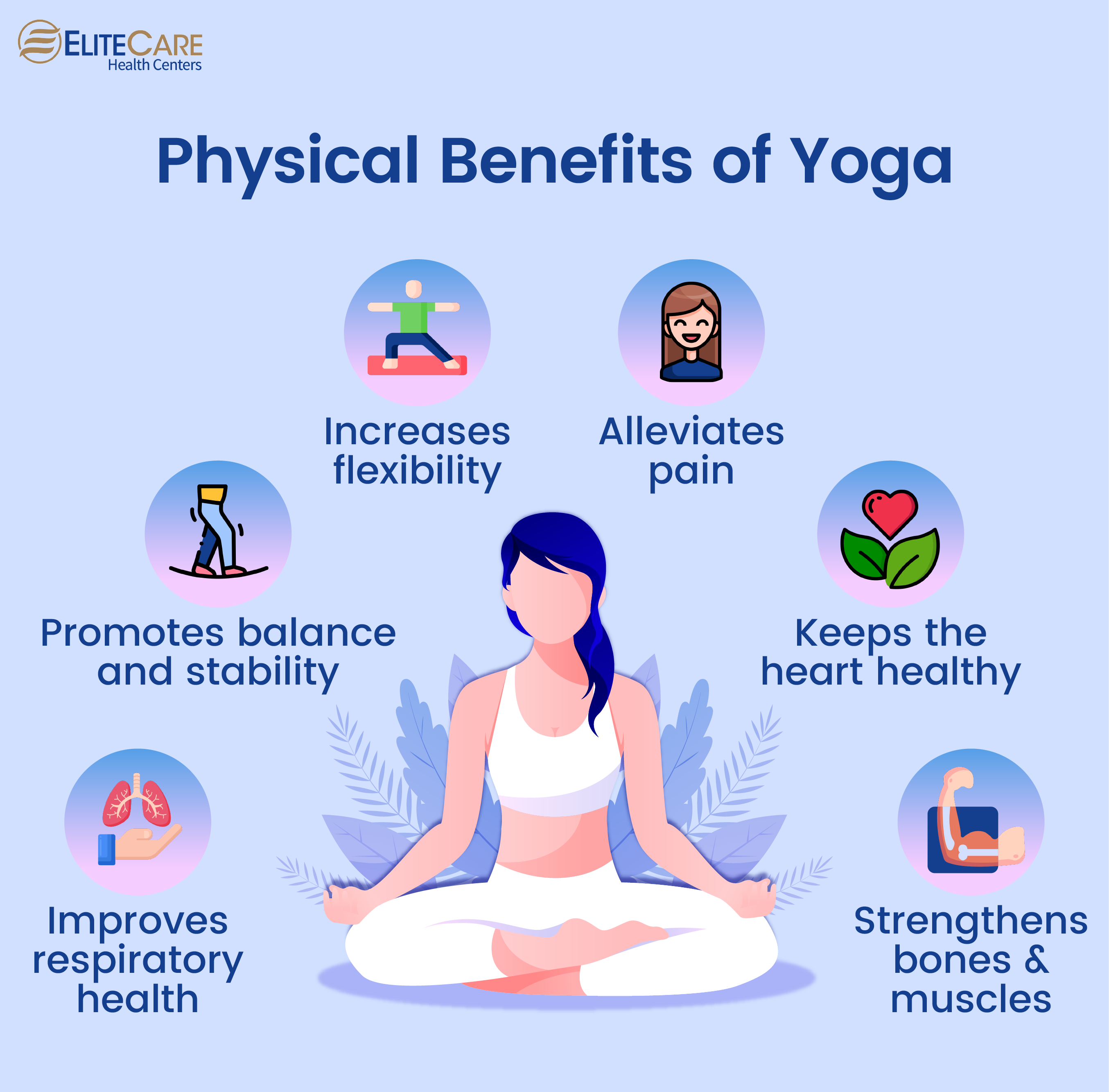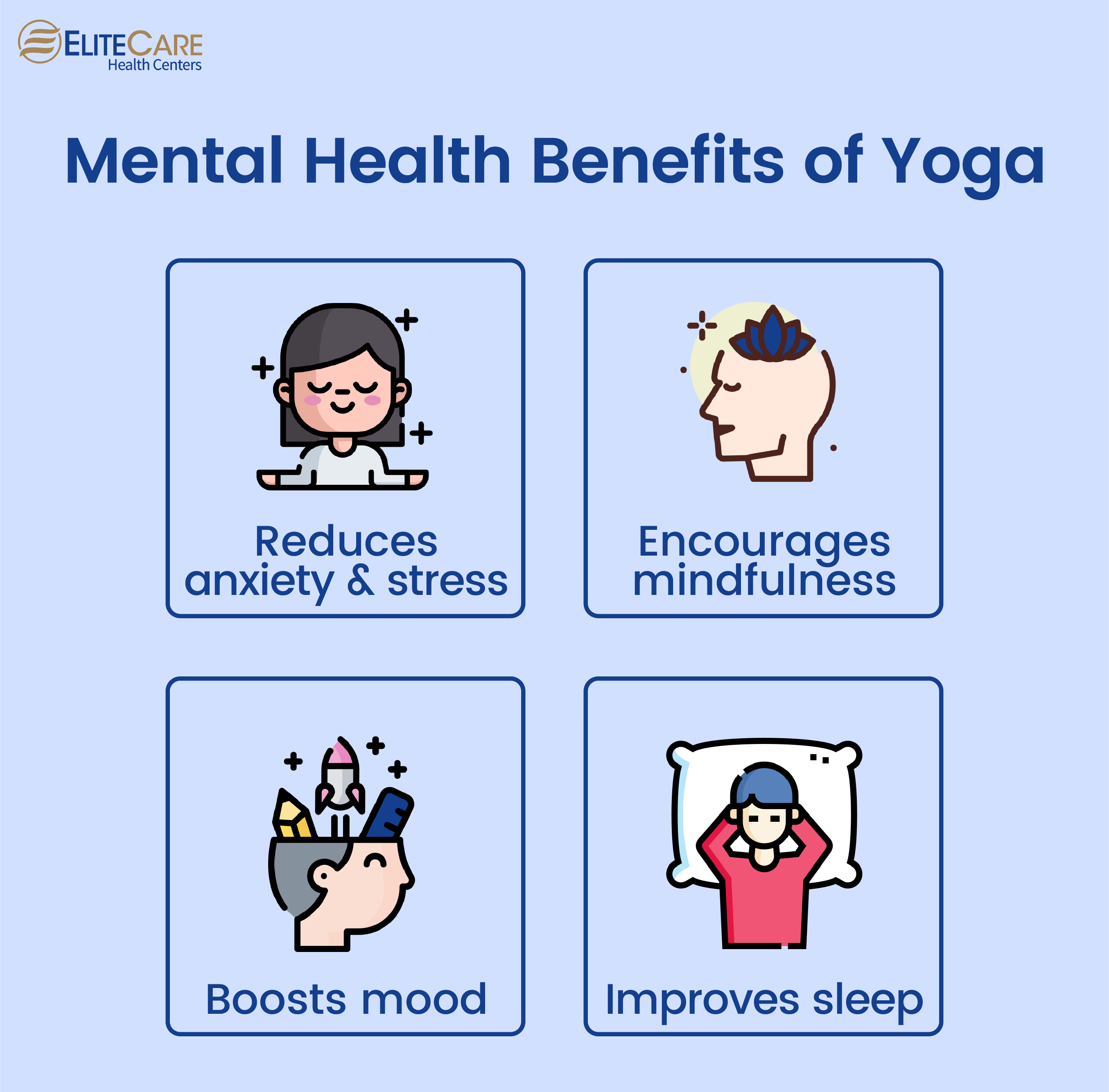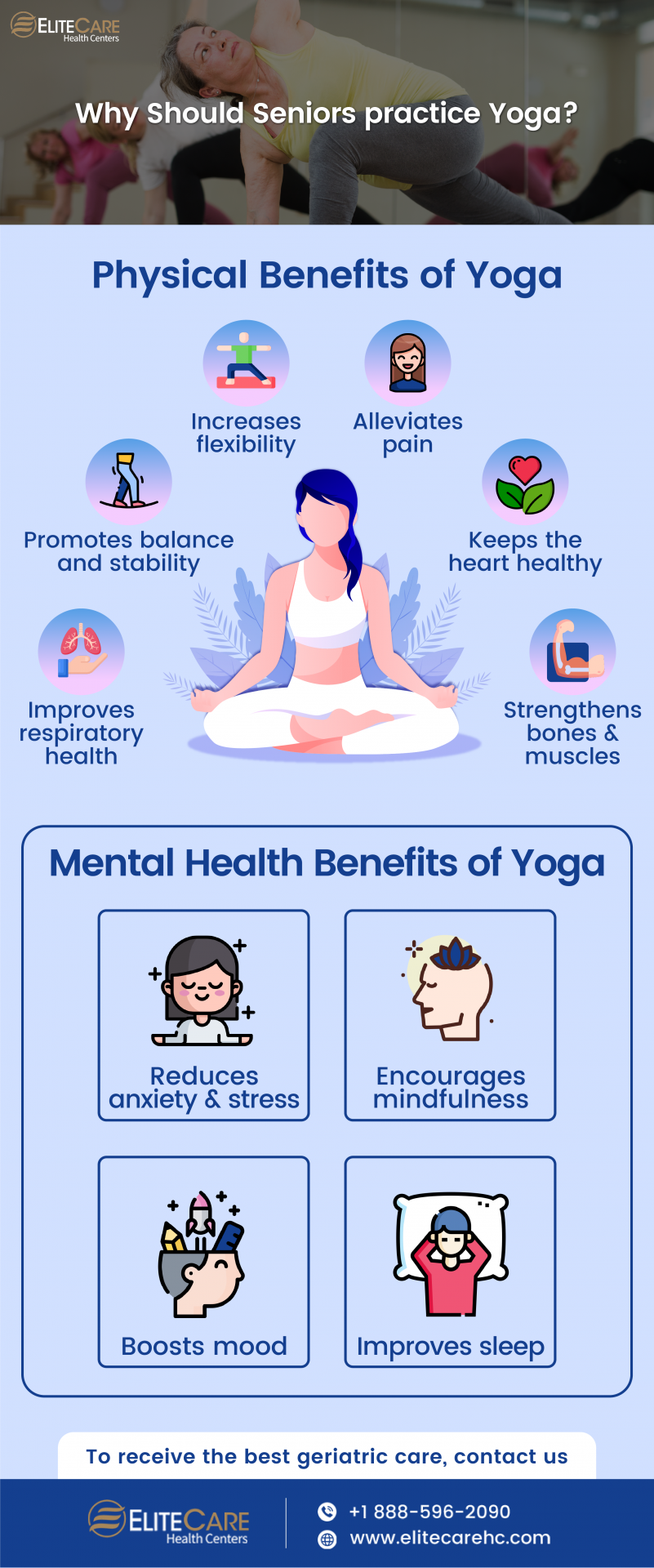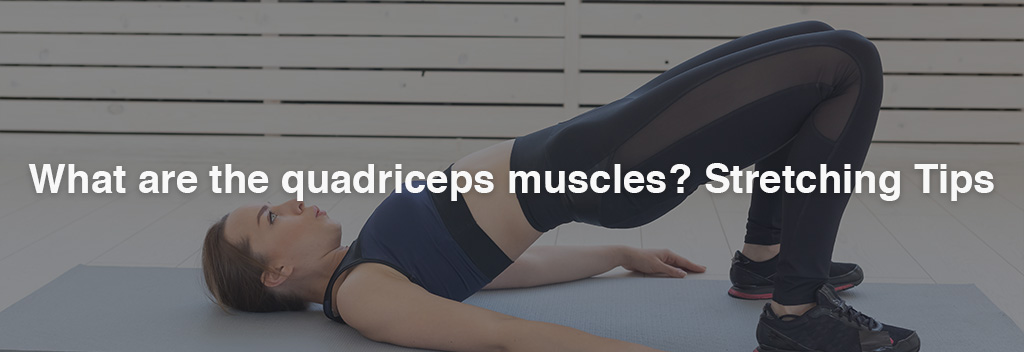
Yoga is an ancient system of physical, mental, and spiritual practices that helps to create a union of the body, mind, soul, and universal consciousness. It uses breathing techniques, postures, relaxation, chanting, and other mindfulness techniques to help people experience deep states of freedom, peace, and self-realization. It has healing properties for young as well as older people and can help maintain physical and mental health. While considering yoga for seniors, start slowly, with beginner-friendly poses, and then gradually choose modifications. Senior yoga routines should be prepared by keeping their underlying health issues in mind. Use the services of a trainer or attend a class specific to your knowledge and practice.
Here are a few ways in which yoga can promote physical and mental wellness among seniors. Let’s find out more!
Benefits of Yoga for Physical Wellness

Increases flexibility
Yoga is a fitness option for seniors to increase flexibility because it is a gentle form of activity that doesn’t put much strain on their aging bodies. It is a low-impact exercise that soothes acing or stiff joints. According to a study, yoga is especially effective to manage osteoarthritis in elderly women.
Promotes balance and stability
Age-related changes to posture and added health issues like arthritis or osteoporosis can reduce balance and stability in seniors. It is essential to strengthen muscles and improve balance to prevent the likelihood of falls. Yoga helps in improving balance by strengthening and stretching tight muscles and challenges static and dynamic balance skills as well.
Keeps the heart healthy
According to researchers, hypertension, or high blood pressure, can lead to cardiovascular disease as well as kidney diseases. Recent studies have revealed that yoga can manage high blood pressure by reducing oxidative stress in the body. Furthermore, it can help reduce the risk of severe cardiac events as well by managing cholesterol levels in the body.
Read More: A Complete Guide to Managing Osteoporosis in Seniors
Improves respiratory health
As we age, we suffer from respiratory limitations and a reduced tolerance for physical exertion. Age limits oxygen flow throughout the body and can lead to breathing troubles. With yoga’s intense focus on breathing, it is considered one of the most effective ways to get relief from respiratory issues. Yoga teaches breathing techniques that open the airways and increase the flow of oxygen.
Strengthens bones and muscles
Seniors often suffer from weak bones and sore muscles that affect their mobility and increase the risk of fall-related injuries. It is because their body produces fewer hormones and minerals needed for the strength of bones. Hence, putting the elderly at an increased risk of osteoporosis, arthritis, and even broken bones. Yoga strengthens bones and muscles by correcting posture and improving balance.
Alleviates pain
Aching joints are a common problem among aging adults. Seniors often make the mistake of practicing intense workouts when they are suffering from pain which can worsen their condition. Yoga improves their range of motion and allows the muscles to loosen up and release built-up tension. Therefore, seniors can get relief from chronic joint pain.
Benefits of Yoga for Mental Wellness

Reduces anxiety and stress levels
Yoga exercises are calm and restorative, relaxing both the body and mind. If practiced regularly, yoga can reduce the sympathetic nervous system’s fight-or-flight response. This is an acute stress response that alters the immune system and increases inflammation in the brain.
Yoga practice focuses on breathing and slow movements to trigger the parasympathetic nervous system which can reduce stress and feelings of anxiety. While practicing the controlled breathing method, if a person inhales and exhales slowly they can get the most effective results from their yoga practice.
Read More: Can Certain Food Improve Your Brain Health?
Boosts mood
Yoga helps in producing serotonin and dopamine, which are associated with higher levels of happiness. Yoga also promotes the production of gamma-aminobutyric acid (GABA), which boosts mood and decreases anxiety. These brain chemicals can together have positive effects on mental health and boost mood.
Improves sleep
Adequate sleep is crucial to mental health. During sleep, certain functions of the body and brain regulate emotions and behaviors. Without proper rest, emotions aren’t processed properly, influencing mood. One way to get better sleep is by establishing a bedtime routine. Including a basic yoga routine before bedtime will create a relaxing routine to help you unwind and prepare for quality sleep throughout the night.
Encourages mindfulness
Yoga strictly focuses on breathing and listening to the body which can help seniors to be more mindful of their physical and mental conditions. Regular practice of yoga not only helps regulate one’s own thoughts and emotions but also makes them more connected to their surroundings. In a way, it teaches mindfulness that allows people to be fully present at the moment and makes them aware of their current feelings and emotions. Focusing on the present moment – calms the chaos of the past or future. Mindfulness influences reactive emotions which can help seniors to have calmer reactions and thought-out responses to stressful events.
How to Start Yoga?
- Check with a doctor before switching to a new exercise regime that includes yoga. Also, discuss what exercises seniors should avoid and set limitations.
- Appoint a certified yoga instructor and practice yoga only under his or her supervision.
- Do not forget to inform the instructor about the existing medical conditions the seniors are battling. It will help them to curate an exercise plan that suits the senior’s health in the best possible way.
- Follow their instructions carefully to avoid any additional pain or injury.
- Put on the right clothes, preferably loose, comfortable clothing in which they can move freely.
- Consistency is the key and the more one practices, the greater the benefits will be. Hence, practice yoga at least 3 times per week to get the most effective results.
Read More: 7 Habits of Healthy Living
Summing Up
Yoga is a safe and effective form of exercise for seniors that they can easily perform under expert supervision. For seniors, caregivers or family members need to choose a class that is appropriate for their fitness level and health condition. To avoid further complications, get a routine exam done before starting on a Yoga routine. Contact your nearest EliteCare Health Centers and book a consultation with our board-certified geriatricians to receive the best primary care service.






